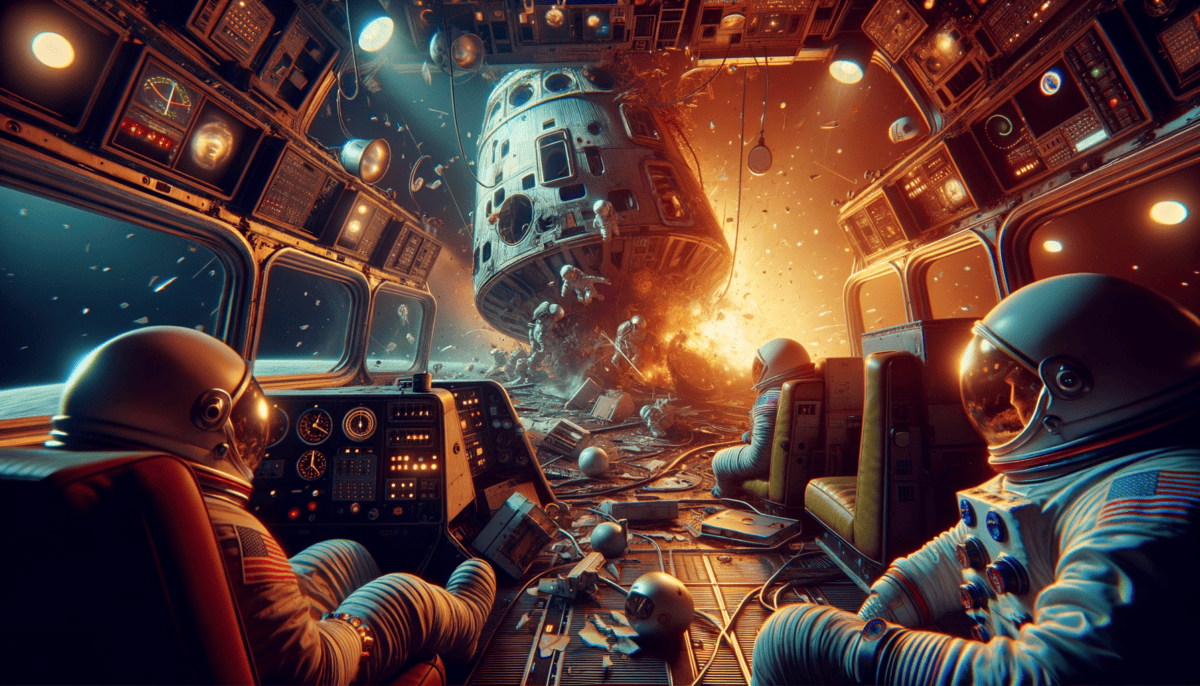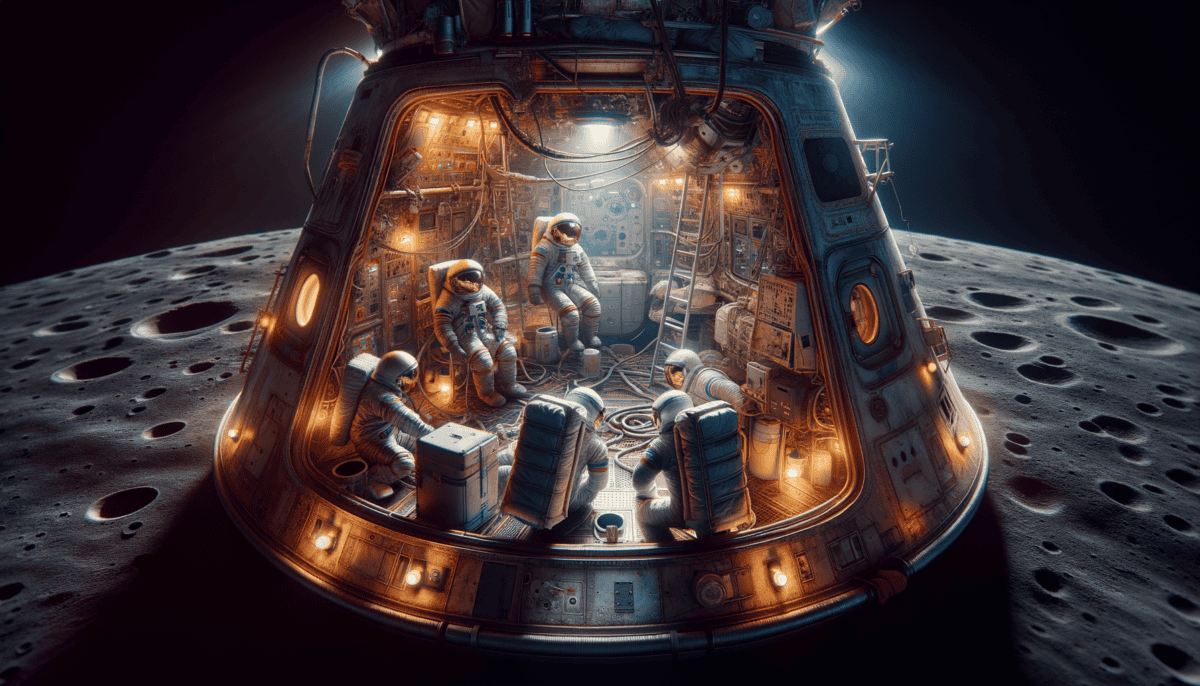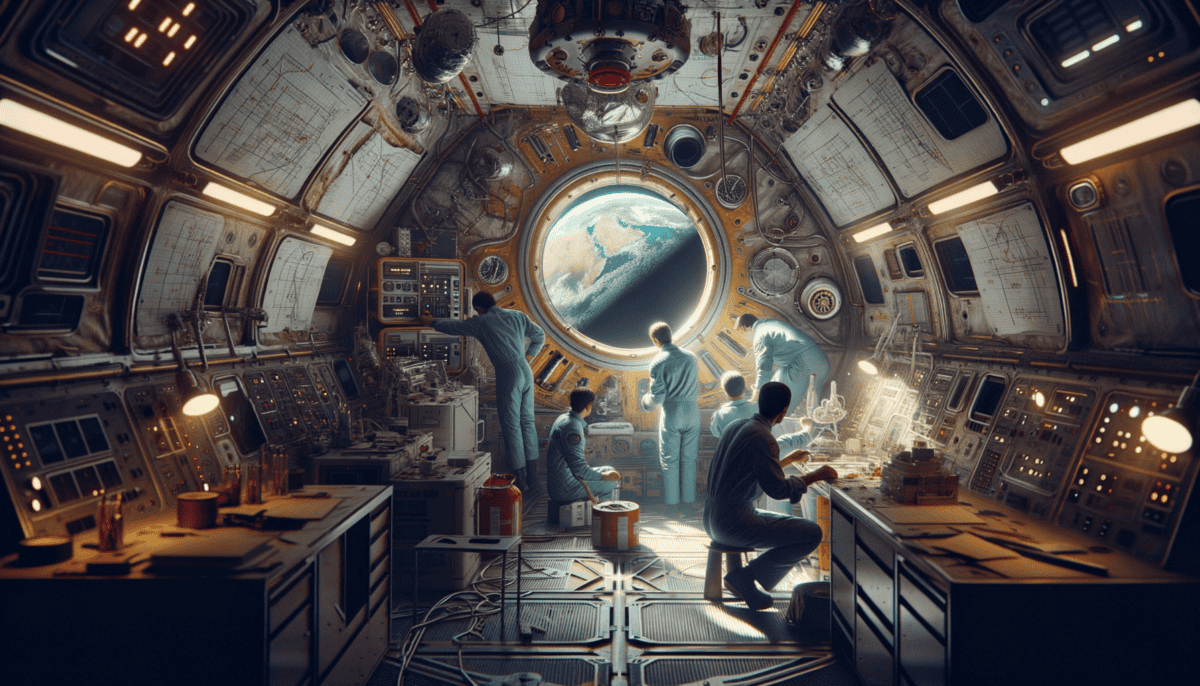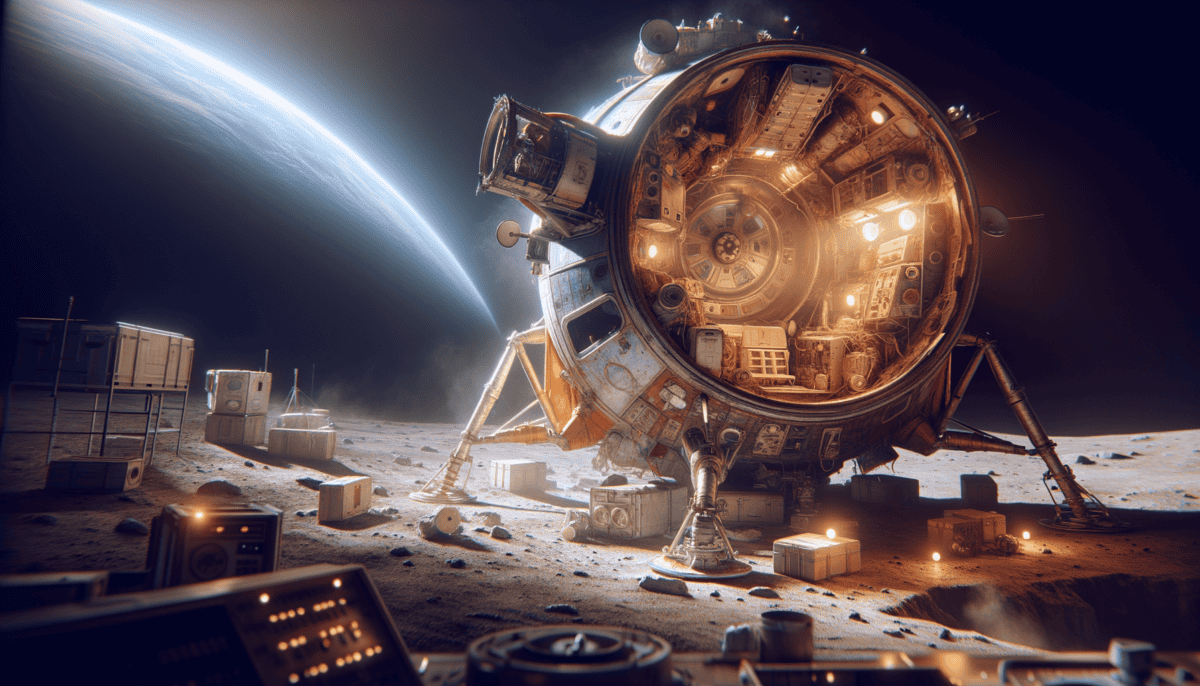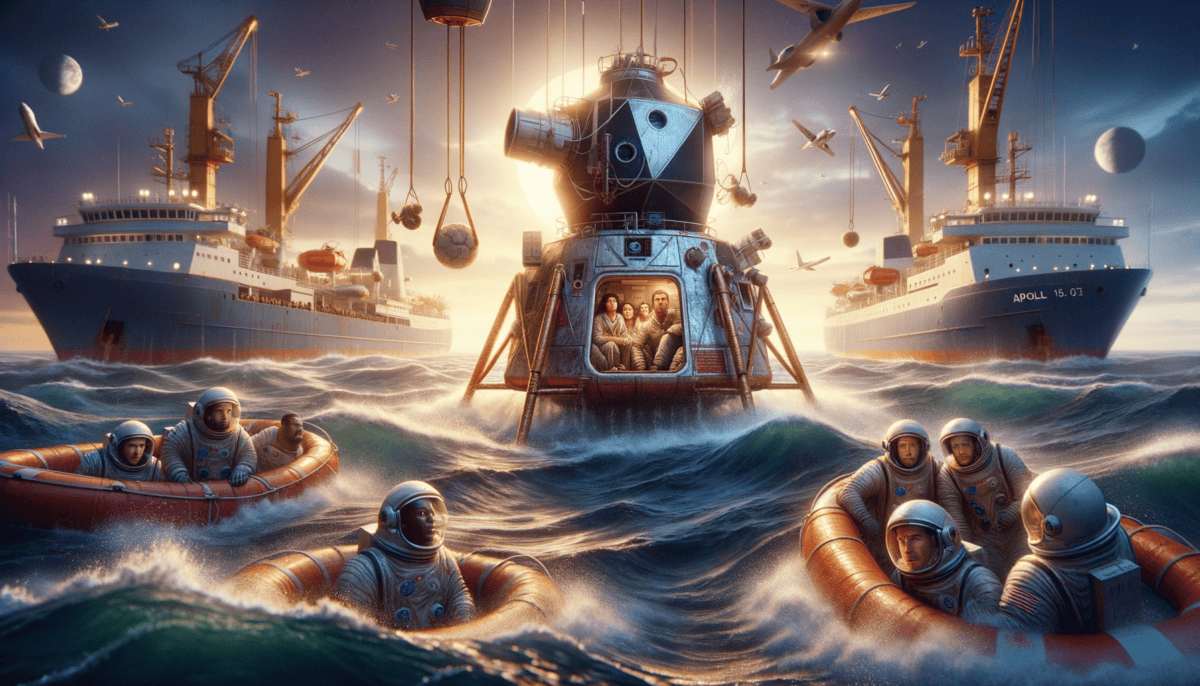Blast Off!
The big day had finally arrived. Jim Lovell looked up at the giant rocket standing tall against the bright blue sky. It was April 11, 1970, and he was about to command one of NASA's most exciting missions – Apollo 13!
"Ready for another trip to the stars?" Fred Haise asked with a big smile. He was one of Jim's crewmates and would help fly the spaceship.
"Born ready," Jim replied, adjusting his space suit. Their third teammate, Jack Swigert, gave them both a thumbs up.
The three astronauts had trained for months for this special mission. Their job was to land on the Moon and explore its surface. It would be the third time humans would walk on the Moon.
"T-minus 10 minutes until launch," came the voice from Mission Control in Houston. The countdown had begun!
Inside the spacecraft, the crew went through their final checks:
• Oxygen tanks ✓
• Navigation systems ✓
• Communication devices ✓
• Engine controls ✓
"Flight controls look good," Jack reported. As the newest member of the team, he wanted everything to be perfect.
The giant countdown clock ticked down: 5… 4… 3… 2… 1…
ROAR!
The rocket's engines came to life with a mighty blast. Flames and smoke filled the air as Apollo 13 lifted off the ground. The whole spacecraft shook as it pushed against Earth's gravity.
"We have liftoff!" shouted Mission Control.
Jim felt the powerful force pushing him back in his seat. Through his window, he watched the Earth get smaller and smaller. The blue sky turned dark as they zoomed into space.
“Houston, Apollo 13. The ride is smooth as silk,” Jim reported.
After a few minutes, they were floating in space! The crew could see the beautiful Earth below them – a big blue and white marble against the black sky filled with twinkling stars.
Fred took some pictures while Jack checked their course to the Moon. Everything was working just as they had planned. The mission was off to a perfect start!
The crew would spend about three days traveling through space before reaching the Moon.
As day turned to night in space, the astronauts settled into their routine. They took turns sleeping, checking instruments, and talking to Houston. Little did they know that their simple Moon mission was about to become one of the most exciting space adventures ever!
"Looking good, Apollo 13," Houston radioed. "You're on your way to the Moon!"
The crew smiled at each other, excited about what lay ahead. They had no idea that their real adventure hadn't even started yet…
The Explosion
Two days into their journey to the Moon, everything was going smoothly. The crew of Apollo 13 had just finished a TV broadcast showing people back on Earth what life was like in space.
"Houston, we've had a problem!" Jim Lovell's voice was calm but urgent. A loud bang had just shaken the whole spacecraft!
"What was that?" Fred asked, floating toward the instrument panel.
"Felt like we got hit by something," Jack said, checking the gauges. The needles were jumping all over the place!
The spacecraft began to wobble. More warning lights blinked on. One of their oxygen tanks had exploded! Precious oxygen was leaking into space.
"We're venting something out into space," Jim reported to Houston. "It looks like a gas of some sort."
Back in Houston, people rushed to their stations. Gene Kranz, the flight director, gathered his team quickly.
"Okay, people, let's work the problem," Gene told his team. "Let's not make it worse by guessing."
The crew worked fast to understand what was happening:
• Checking all systems
• Reading instrument panels
• Looking out windows
• Talking to Houston
• Trying to save power
Their power was getting low. The spacecraft was getting colder. And worst of all – they were losing the oxygen they needed to breathe!
"Listen up," Jim told his crew. "We need to move into the Lunar Module. It will be our lifeboat."
The Lunar Module was the part of the spacecraft meant to land on the Moon. Now it would have to save their lives!
Fred and Jack quickly moved important things into the Lunar Module. They had to work fast – their main spacecraft was dying.
"We're not going to the Moon anymore," Jim told Houston. "We just want to come home."
As the astronauts huddled in the small Lunar Module, they knew their mission had changed. Now, instead of walking on the Moon, they had a new goal – staying alive in space!
The whole world was watching and hoping. Could these brave astronauts make it back to Earth safely? Their greatest challenge was just beginning…
Fighting for Survival
The Lunar Module felt tiny and cold. It was like being stuck in a small camping tent in winter! Jim, Jack, and Fred huddled together, trying to stay warm.
“How long will our oxygen last?” Fred asked, his breath visible in the cold air.
“If we’re careful, we have enough for about 60 hours,” Jim replied, checking the gauges. “We need to save every bit we can.”
The crew faced many big problems:
• Very cold temperature
• Limited power
• Not much oxygen
• Little drinking water
• Small space to move
“It’s getting really cold in here,” Jack said, rubbing his hands together. The temperature had dropped to just 38 degrees – like a refrigerator! ❄️
“We’ll have to wear our space suits,” Jim decided. “They’ll help keep us warm.”
In Houston, teams worked day and night to help the astronauts. They needed to figure out how to get them home safely!
“We need to save power,” Jim told his crew. “Turn off everything we don’t absolutely need.”
One by one, they shut down systems. The cabin got darker and darker. Only a few essential lights stayed on.
“Look,” Fred said, pointing out the window. “We can see Earth now. It looks so far away.”
Earth did look far away – like a small blue marble floating in space. Home seemed impossible to reach.
“Houston, how’s our course looking?” Jim asked through the radio.
“You’re on the right path,” came the reply. “But we need to save more power. Can you shut down more systems?”
The astronauts worked together to solve problems. They used tape and spare parts to fix things. They wrote down numbers and did math problems to stay on course.
“We’re like campers in space,” Jack joked, trying to stay cheerful. “Just without the campfire!” ️
But it wasn’t funny when the carbon dioxide levels started rising. Too much carbon dioxide would make them sick! They needed to find a way to clean the air – and fast!
“Mission Control is working on a solution,” Jim assured his crew. “They won’t let us down.”
The whole world watched and waited. People everywhere prayed for the astronauts to come home safely. Could the crew of Apollo 13 survive this dangerous journey? Would they ever see their families again?
Building Hope
The biggest problem now was the air! There was too much carbon dioxide in the tiny Lunar Module. It was like being stuck in a car with all the windows closed.
“The carbon dioxide filters are getting full,” Jack reported, checking the instruments.
In Houston, a team of engineers spread out parts on a big table. They had to find a way to clean the air using only things the astronauts had on the spacecraft. ️
“Okay, listen carefully,” said the voice from Mission Control. “We’re going to build something special.”
“Take out your spare suit hoses and grab the duct tape,” the voice continued. “We’re going to make a square filter fit in a round hole!”
The astronauts gathered their supplies:
• Plastic bags
• Cardboard covers
• Suit hoses
• Lots of duct tape
• Command Module filters
“This is like a craft project,” Fred said, trying to smile as they worked. They followed Houston’s instructions step by step.
“Hold the hose here,” Jim directed. “Jack, can you tape this part?”
Their hands were cold and shaking, but they kept working. They had to get it right!
“It looks funny,” Jack said when they finished. “But will it work?”
“Sometimes the best solutions aren’t pretty,” Jim replied. “They just need to work!”
They installed their homemade filter. Everyone held their breath, waiting to see if it would clean the air.
“Great job, everyone!” Mission Control cheered. The crew could breathe easier now – literally!
But they still faced other problems. The spacecraft needed to stay on the right path home. They had to be very careful with their power. And it was still freezing cold! ❄️
“Look at that view,” Fred said, gazing out the window at the stars. Space was beautiful, but now it felt dangerous too.
“We’ve solved one big problem,” Jim said. “We can solve the others too. We just need to keep working together.”
The whole world was still watching. News reporters told everyone about the brave astronauts. Children in schools drew pictures and wrote letters wishing them a safe journey home.
The crew of Apollo 13 had won this battle. But would they win the war against space and time? Could they make it back to Earth before their supplies ran out?
Racing Against Time
The spacecraft was getting closer to Earth, but danger still followed Apollo 13. The astronauts were tired, cold, and worried. Their tiny “lifeboat” had kept them alive, but would it get them home?
“How much power do we have left?” Jim asked, his breath visible in the cold cabin.
“Just enough for re-entry,” Jack replied, checking the gauges. “We can’t waste any.”
Fred looked out the window. “Earth looks so close, but so far away.” The blue planet was growing larger each hour.
“We’re going to make it,” Jim said firmly. “We’ve come too far to fail now.”
In Houston, teams worked around the clock. They needed to figure out the perfect path home. It was like throwing a paper airplane – but the airplane was carrying three lives! ✈️
“Houston to Apollo 13,” crackled the radio. “We need you to make one more course correction.”
The crew worked together:
• Jim watched the clock
• Jack controlled the engines
• Fred checked their direction
• Mission Control counted down
“Engine burn in 3… 2… 1…” The spacecraft shuddered as they fired the engines.
“That’s it!” Houston called. “Perfect burn, Apollo 13!”
But their troubles weren’t over. The temperature kept dropping. Ice formed on the windows. The astronauts could barely feel their fingers. ❄️
“Just a few more hours,” Jim reminded everyone. “Stay strong.”
They were getting closer to Earth’s atmosphere. Soon they would need to turn their Command Module back on. Would it still work after being frozen for days?
“Look!” Fred pointed out the window. The sun was rising over Earth’s curve, painting the sky in beautiful colors.
“That’s home,” Jack said softly. “We’re almost there.”
The world held its breath. Television stations showed pictures of the rescue ships waiting in the ocean. Children stayed up late to watch the news. Everyone hoped the brave astronauts would make it home safely.
Now came the scariest part – entering Earth’s atmosphere. Would their damaged spacecraft protect them from the intense heat? Would their calculations work? The next few minutes would tell if Apollo 13’s amazing story would have a happy ending.
Coming Home Heroes
Fire streaked across Apollo 13’s windows as it hit Earth’s atmosphere. The spacecraft shook hard, like a leaf in a storm. Inside, the three astronauts held tight to their seats.
“Four minutes to splashdown,” Houston’s voice crackled through the radio. The whole world was watching and waiting.
“We’re coming in hot, but we’re coming in right,” Jim said calmly, even though his heart was racing.
“I see the parachutes!” Fred called out as three white sheets bloomed above them. The spacecraft started floating down more slowly.
Jack watched the altimeter. “Looking good… looking good…”
SPLASH! Apollo 13 hit the ocean at 1:07 PM on April 17, 1970. Waves rocked the spacecraft gently.
Rescue helicopters zoomed toward them. Soon, friendly faces were helping them out of their spacecraft.
“Welcome home, Apollo 13!” the rescuers cheered.
The things that helped save Apollo 13:
• Brave astronauts who never gave up
• Smart people at Mission Control
• Creative thinking to fix problems
• Everyone working together
Back on Earth, the astronauts got warm blankets and hot food. They hadn’t slept well in days, but they were smiling. They had made it!
“This mission was a failure,” someone said to Jim Lovell.
“No,” Jim replied. “It was our finest hour.”
The story of Apollo 13 changed NASA forever. They made spaceships safer and learned new ways to fix problems in space.
Today, astronauts still study what happened on Apollo 13. They learn how three brave men and hundreds of helpers on Earth turned disaster into triumph.
Jim, Fred, and Jack didn’t walk on the Moon like they planned. But they did something even more special – they showed the whole world what courage looks like.
Years later, when kids asked Jim Lovell about Apollo 13, he would smile and say, “Remember, there’s no such thing as impossible when people work together.” ⭐
The end of Apollo 13’s journey wasn’t just about getting home. It was about proving that when things go wrong, human spirit, teamwork, and never giving up can overcome any challenge.


